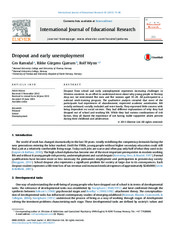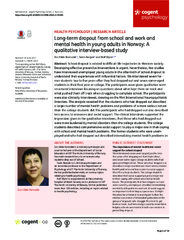| dc.contributor.advisor | Wynn, Rolf | |
| dc.contributor.author | Ramsdal, Gro Hilde | |
| dc.date.accessioned | 2018-10-26T07:21:23Z | |
| dc.date.available | 2018-10-26T07:21:23Z | |
| dc.date.issued | 2018-10-01 | |
| dc.description.abstract | <i>Objectives</i>: We wanted to explore how unemployed youth, between 18 and 25 years of age, who had dropped out of school and were registered at the Norwegian Labour and Welfare Administration (NLWA), would describe and explain critical aspects of their school dropout processes (Study 1). Second, we wanted to investigate critically present knowledge on the role of parent-child attachment in school dropout processes (Study 2). Third, we wanted to study the motivational experiences of unemployed youth who had dropped out of school and were registered at the NLWA, focusing in particular on the role of mental health problems in these motivational processes (Study 3). <p>
<p><i>Methods</i>: Study 1 consisted of 10 qualitative semi-structured interviews analyzed by qualitative methodology drawing on concepts from Grounded Theory. Study 2 was a narrative review investigating studies focusing four particular mediation hypotheses linking parent-child attachment to academic performance and high-school dropout. Study 3 consisted of 14 qualitative semi-structured interviews analyzed using a qualitative methodology drawing on concepts from Grounded Theory and 14 clinical interviews (M.I.N.I.). <p>
<p><i>Findings</i>: In the aftermath of school dropout, unemployed youths focused their experiences of abandonment, lack of adult involvement, loneliness and problems in connecting with peers, when describing their dropout processes. They also described experiences of academic failure and amotivation (study 1). The narrative review found that many studies tested associations between potential mediators and parent-child attachment or academic achievement (study 2). However, only two longitudinal studies actually tested for statistical mediation effects. Although they gave some support to all the four mediation hypotheses, a complex interaction of socio-emotional processes and academic performance seems to offer the best explanations of school dropout. Study 3 found that participants who had dropped out described more frequent and more serious symptoms of mental health problems and less social support than did same-aged college students.<p> | en_US |
| dc.description.doctoraltype | ph.d. | en_US |
| dc.description.popularabstract | This thesis focused on the process of dropping out of school in Norway. We interviewed youth about their experiences in the aftermath of school dropout. The participants focused on their experiences of abandonment, lack of adult involvement and academic demotivation but also described feelings of social awkwardness and loneliness. These ‘off track’ youths reported more frequent and serious symptoms of mental health problems and less social support than same aged college students that we also interviewed. Reviewing the research literature on the role of parent-child attachment in dropout processes, we found some support for explanatory factors like self-regulation, maternal instruction, social competence and test anxiety, linking attachment to school dropout. The findings seem to point to relationships as essential and possibly underrated factors in school motivation processes. | en_US |
| dc.description.sponsorship | Finansiert av den tidligere Høgskolen i Harstad og nå UIT | en_US |
| dc.identifier.uri | https://hdl.handle.net/10037/14039 | |
| dc.language.iso | eng | en_US |
| dc.publisher | UiT The Arctic University of Norway | en_US |
| dc.publisher | UiT Norges arktiske universitet | en_US |
| dc.relation.haspart | <p>Paper 1: Ramsdal, G.H., Gjærum, R.G. & Wynn, R. (2013). Drop out and early unemployment. <i>International Journal of Educational Research, 62</i>, 75-86. Also available at <a href=https://doi.org/10.1016/j.ijer.2013.06.011>https://doi.org/10.1016/j.ijer.2013.06.011.</a> <p>
<p>Paper 2: Ramsdal, G.H., Bergvik, S. & Wynn, R. (2015). Parent-child attachment, academic performance, and the process of high-school dropout: A Narrative Review. <i>Attachment & Human Development, 17</i>,(5), 522-545. Full text not available in Munin due to publisher restrictions. Published version available at <a href=http://dx.doi.org/10.1080/14616734.2015.1072224> http://dx.doi.org/10.1080/14616734.2015.1072224. </a><p>
<p>Paper 3: Ramsdal, G.H., Bergvik, S., & Wynn, R. Long-term dropout from school and work and mental health in young adults in Norway: A qualitative interview-based study. <i>Cogent Psychology, 5</i>: 1455365. Also available at <a href=http://hdl.handle.net/10037/13401>http://hdl.handle.net/10037/13401.<p> | en_US |
| dc.rights.accessRights | openAccess | en_US |
| dc.rights.holder | Copyright 2018 The Author(s) | |
| dc.rights.uri | https://creativecommons.org/licenses/by-nc-sa/3.0 | en_US |
| dc.rights | Attribution-NonCommercial-ShareAlike 3.0 Unported (CC BY-NC-SA 3.0) | en_US |
| dc.subject | VDP::Medisinske Fag: 700::Klinisk medisinske fag: 750 | en_US |
| dc.subject | VDP::Medical disciplines: 700::Clinical medical disciplines: 750 | en_US |
| dc.title | Attachment problems and mental health issues among long-term unemployed youth who had dropped out of high school | en_US |
| dc.type | Doctoral thesis | en_US |
| dc.type | Doktorgradsavhandling | en_US |


 English
English norsk
norsk


